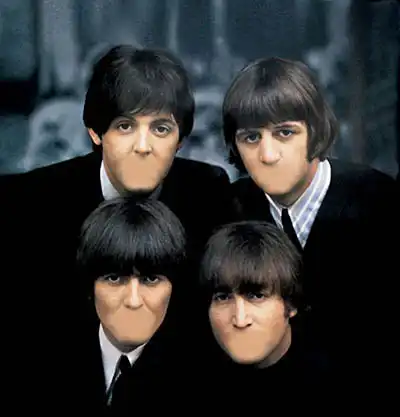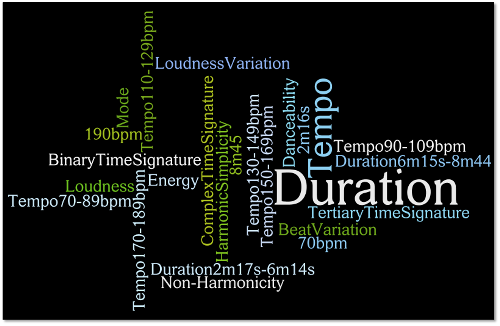No Hit Song Without Words Thoughts on music research, by Stefan Stenudd
It's a University of Bristol team doing this research, which they present at this website: The Hit Equation (BBC News writes about it here). Here's the formula they use to decide if a song will be a hit (#5 or higher on the British chart):
This may seem impressive – better than 50/50. But they've done no comparison with other methods, not even that of pure chance, like the flipping of a coin. Actually, one would get a much better result by just guessing that every song would fail, since a vast majority of songs never make it on the charts. Their formula would be impressive only if 60% of the songs they predicted to be hits actually became hits. That's the tricky part. Below is their own image of the many aspects of the songs they consider important for making a hit:

The lyrics are instrumental to the listening experience. Already the fact that extremely few purely instrumental tunes through the past decades have become hits should tell the researchers that they are missing something fundamental. The obvious examples of hits depending on their lyrics are countless. What would Chris Medina's song What Are Words be without words? And what about the songs of Adele? All of rap music? Lady Gaga? Beyoncé's Single Ladies, If I Were a Boy and Halo, Christina Aguilera's Beautiful, Bruno Mars' Grenade and Lazy Song, and on and on and on. It's even more obvious when digging deeper into the modern history of popular music: Bob Dylan, almost every song by the Beatles, David Bowie, Stairway to Heaven, Sympathy for the Devil, REM, Simon & Garfunkel, Respect, The Doors, U2, punk rock, Prince's Kiss, Bruce Springsteen, Bohemian Rhapsody, The Kinks, Nirvana, My Generation, Hotel California, The Wall... Maybe, for getting to #5 on the chart, some musical recipe gets a better chance than 50/50, which is not bad at all. But to become a tune remembered and repeated through the decades, outstanding lyrics are a must. The Bristol researchers might have considered including lyrics in their parameters, but in that case they surely surrendered to the difficulty of turning words into numbers. It can't be done in a meaningful way. Music is another matter. It consists of mathematics, as already Pythagoras told us. There are scales, beats per minute, volume, measurable vibrations, and so on. That allows for a formula, although it can be discussed how useful it is. Words are symbols of very complex meanings. They can't be removed from their context, which is in itself so vast that it's very difficult to describe at all. Words are more like fuzzy math, lacking precision and thereby embracing more than numbers ever can. But the Bristol researchers will surely find their allies in the music industry. Record companies have all the time believed that they could calculate how to make a hit. That's what they prefer, since it would mean they wouldn't need to find talents – something they mainly stink at. The record industry wants cute and replaceable kids to mold into what “the business” regards as hit making machinery. They constantly fail, of course, but that doesn't stop them from going on with the same brain dead modus operandi. And their trade is far from alone in this. Commercialism prefers robots that buy the products if just the right button is pressed. That's their paradigm: Man is nothing but a consumer, responding only to the simplest signals. And they want us to behave in no other way. Instead, they use all their resources to brainwash us into an ever more simplified pattern of stimuli and response. That's the bottom line of capitalism – turning mankind into obedient consumers, all of us buying the same things. In communism, the fundamental principle is not very different: They want robots who repeat like tape recorders what their leaders preach. So, it's all about obedience. The people in power seek to be obeyed, without questioning, without alternatives. It's evil. And the Bristol researchers comply, trying to serve the music industry another instrument by which they can imagine to succeed in replacing the wonderful and dynamic complexity of the motivations of the human being into Pavlovian reflexes. It's impossible, but there's a lot of nonsense going on before they ever give it up.
Stefan Stenudd December 19, 2011
Click here for more reviews
About CookiesMy Other WebsitesCREATION MYTHSMyths in general and myths of creation in particular.
TAOISMThe wisdom of Taoism and the Tao Te Ching, its ancient source.
LIFE ENERGYAn encyclopedia of life energy concepts around the world.
QI ENERGY EXERCISESQi (also spelled chi or ki) explained, with exercises to increase it.
I CHINGThe ancient Chinese system of divination and free online reading.
TAROTTarot card meanings in divination and a free online spread.
ASTROLOGYThe complete horoscope chart and how to read it.
MY AMAZON PAGE
MY YOUTUBE AIKIDO
MY YOUTUBE ART
MY FACEBOOK
MY INSTAGRAM
STENUDD PÅ SVENSKA
|
 Ever Young
Ever Young